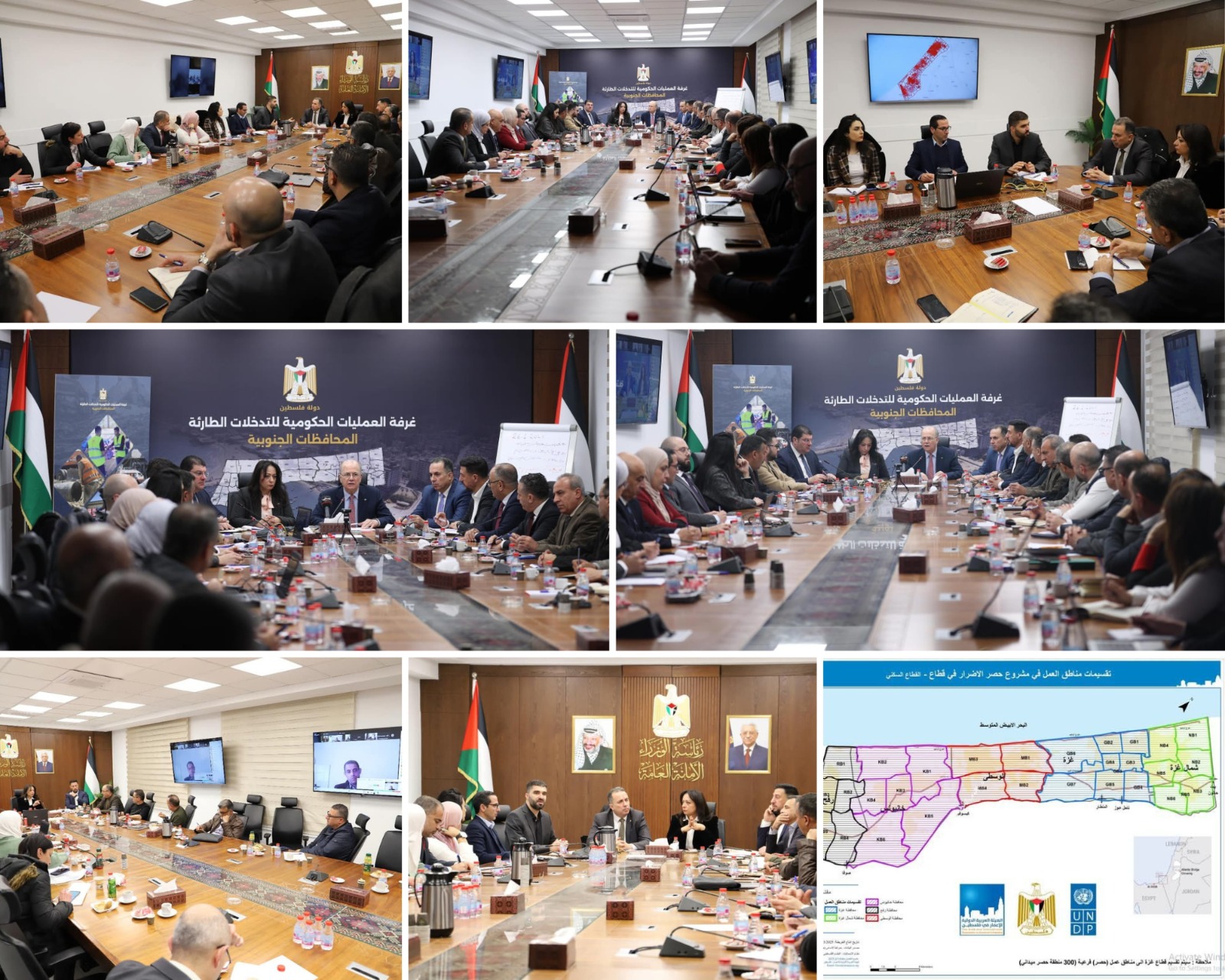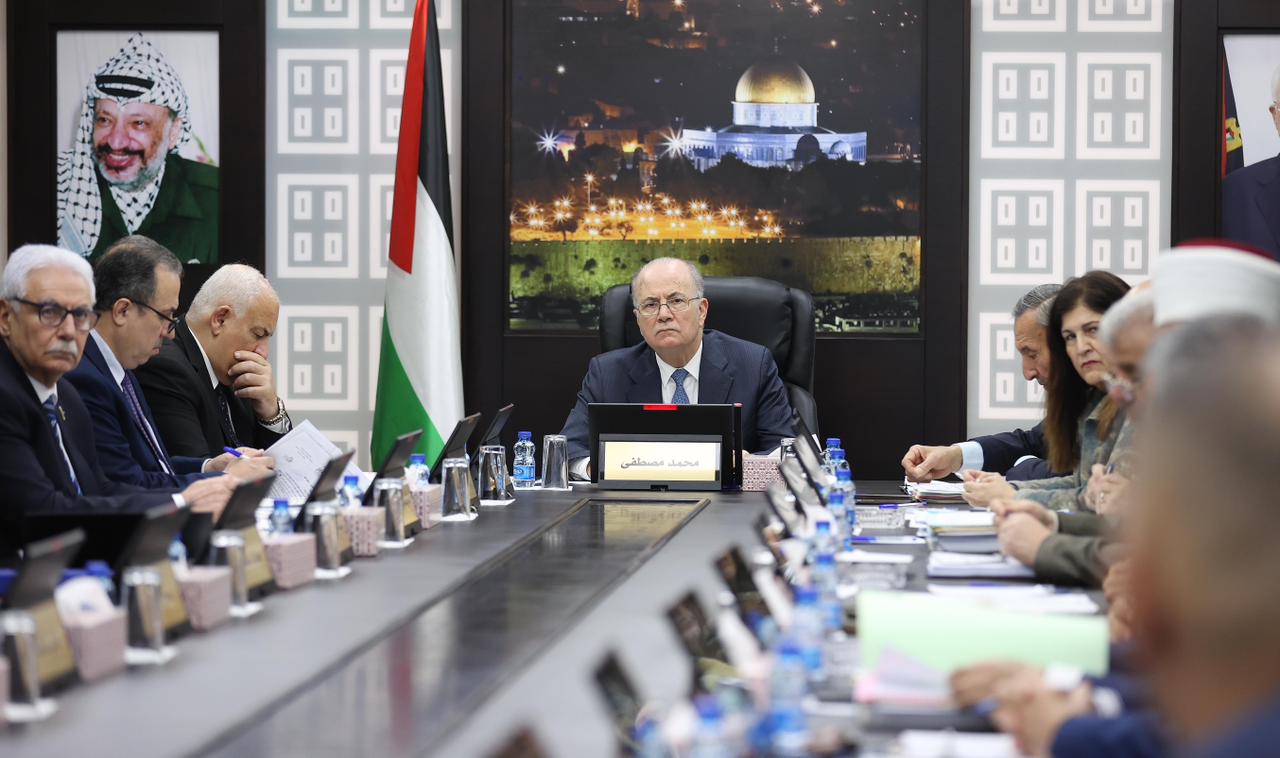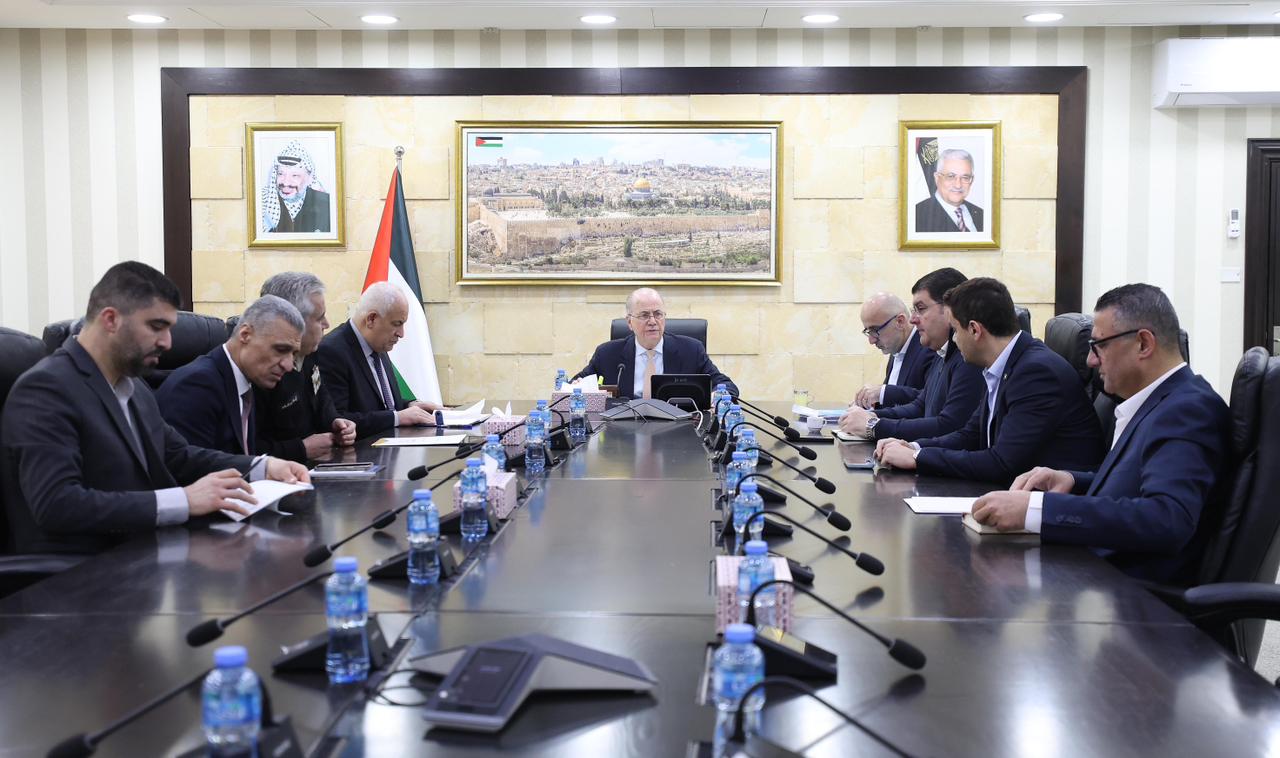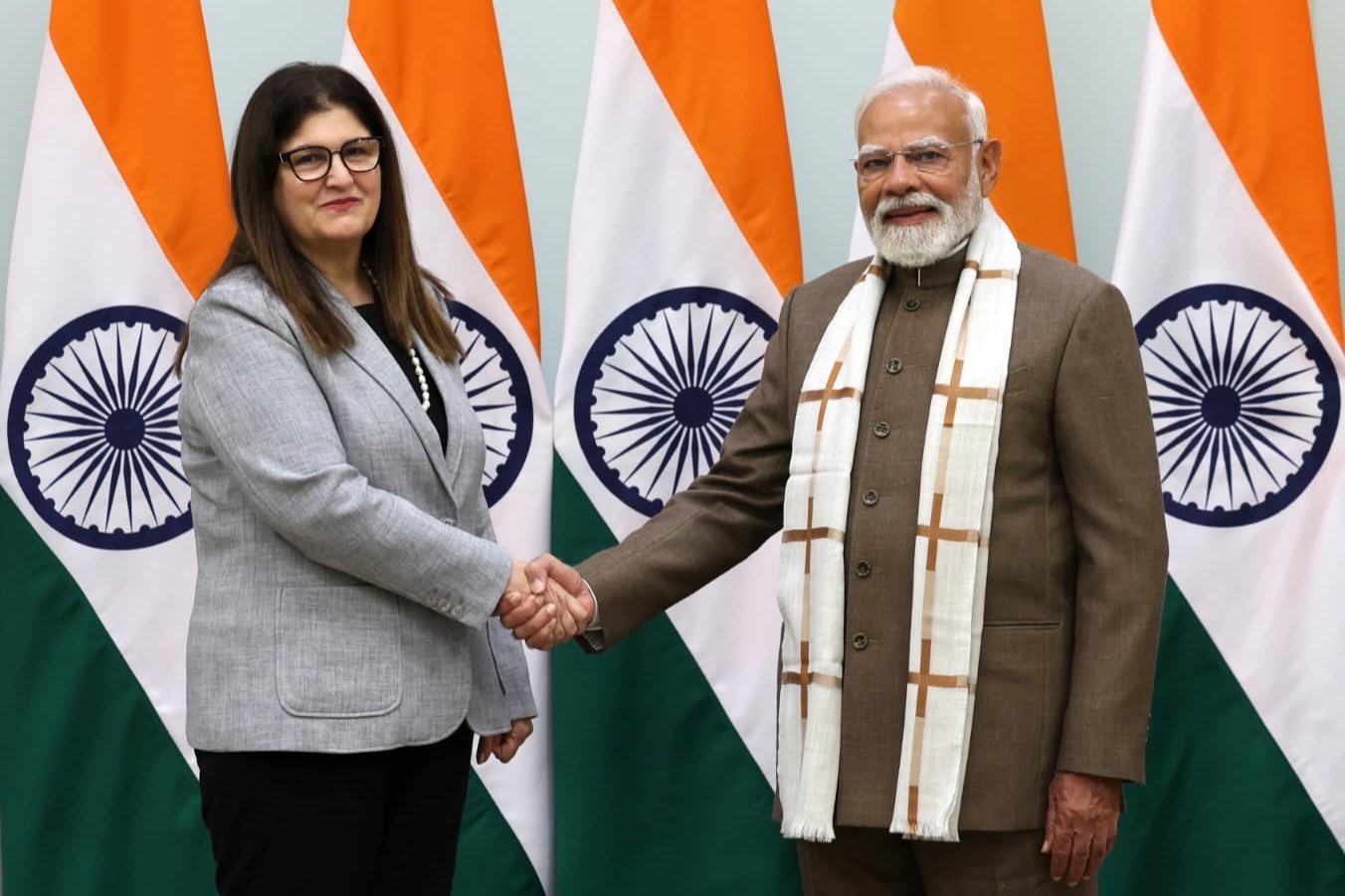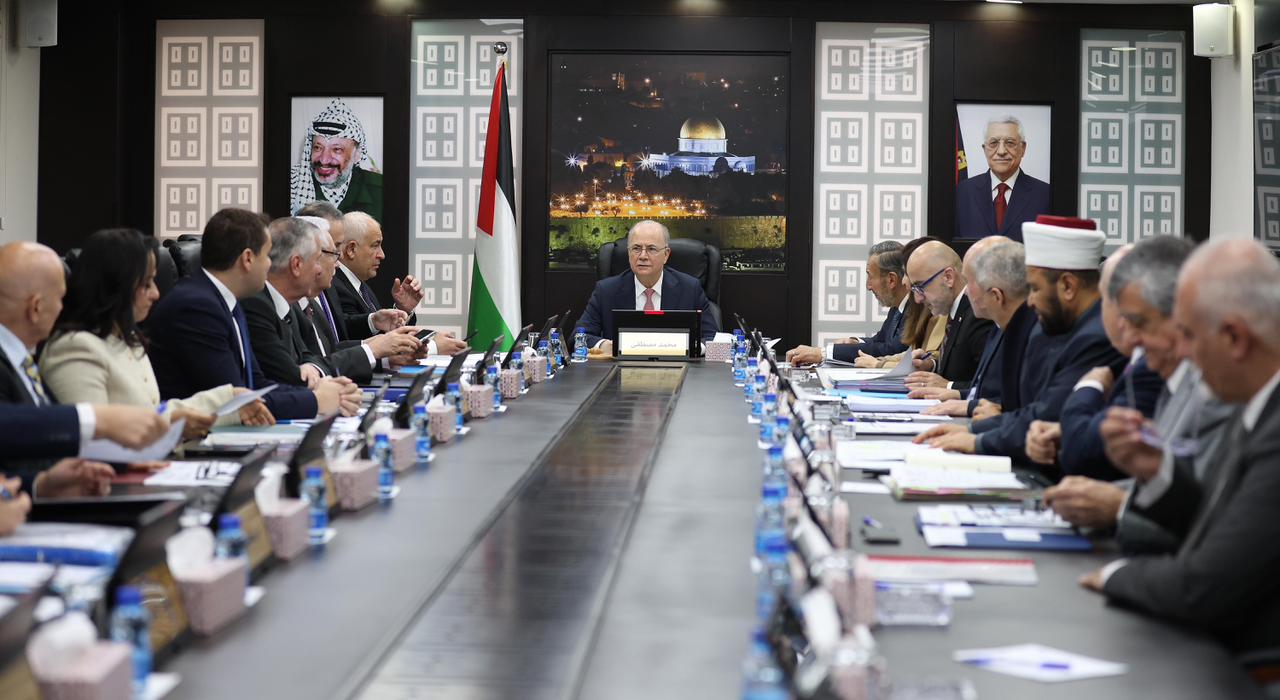RAMALLAH, January 28, 2025 (WAFA) – Following the establishment of the Government Operations Room for Emergency Interventions in the Gaza Strip, designed to coordinate and oversee the efforts of government field teams, the Palestinian Government continues to intensify its efforts to sustain emergency interventions in the Strip, based on its Relief, Early Recovery and Emergency Response Plan for Gaza.
On Sunday morning, Prime Minister Dr. Mohammad Mustafa visited the Government Operations Room for Emergency Interventions in Gaza, which comprises representatives from over 20 official institutions, with the participation of the United Nations Development Programme (UNDP) and the Palestinian Red Crescent Society. It operates through task forces from various ministries and agencies in both the West Bank and Gaza, supported by other institutions as needed, and remains in continuous session.
During the visit, the Prime Minister reviewed the progress and implementation of the Government's emergency response plan, and field coordination of humanitarian and relief interventions, with the participation of field teams operating in Gaza via video conferencing.
The Prime Minister also reviewed the key achievements and initial outcomes of the operations room’s efforts, which included identifying preliminary sites for sheltering displaced people. This process involved GIS surveying to locate safe and suitable areas for shelter establishment, in collaboration with the Ministry of Public Works and Housing, the Land Authority, the Ministry of Local Government, and partners.
Dr. Mustafa emphasized that the severity of suffering among our people in Gaza requires collective support for the Government in implementing its interventions and response plan in the Strip. This support is needed from civil society, the private sector, and international partners.
Additionally, the Government Operations Room has formed a task force of various government institutions to put in place the implementation plans for debris removal, in collaboration with international partners, primarily the UNDP.
The Palestinian Red Crescent Society presented an overview of ongoing efforts to restore health services in the northern governorates of the Gaza Strip, in partnership with the Ministry of Health. These efforts include activating 26 medical points across the Strip, relocating a field hospital to the northern Gaza Strip, and continuing coordination with the Egyptian Red Crescent and the International Red Cross to facilitate the entry of aid into Gaza through all border crossings, as well as deploying additional field hospitals.
Moreover, the UNDP representative affirmed commitment to providing all possible support to the Government’s efforts. This includes backing the implementation of the emergency response plan for rubble removal and providing logistical assistance to the field teams working on the ground.
Summary of Recent Government Interventions:
The Government Communication Center released a report highlighting key emergency interventions carried out by the Palestinian Government in Gaza over the past week. These efforts included the work of field teams on the ground, in cooperation and coordination with relevant institutions. The report highlights several key achievements, including:
1. Damage Assessment and Reconstruction: Under the directives of Prime Minister Dr. Mohammad Mustafa and the supervision of the Ministry of Public Works and Housing, in partnership with UNDP and reconstruction bodies, the Government has launched a damage assessment program in Gaza. The program will see the deployment of 700 engineers, who will be tasked with conducting thorough damage assessments across Gaza, paving the way for recovery and reconstruction phase, based on a comprehensive plan that includes rubble removal and temporary shelter.
2. International Engagements: Prime Minister Dr. Mohammad Mustafa met with Sigrid Kaag, the Senior Humanitarian and Reconstruction Coordinator for Gaza, to discuss the coordination of joint efforts and practical steps in implementing the Government’s plan for relief, early recovery, and emergency response in the Gaza Strip. Also, the Prime Minister emphasized, during his meeting with the UN Humanitarian Coordinator for the Occupied Palestinian Territory, the importance of focusing on restoring basic services in Gaza alongside relief efforts.
3. Humanitarian Aid Provision: The Ministry of Social Development continues its efforts, in cooperation with the Palestinian Red Crescent Society and relief organizations, to deliver more emergency aid to our people in the Gaza Strip. This includes 200 pallets of winter clothing to meet the dire needs of displaced Palestinians amidst the cold weather, ensuring fair aid distribution to those who are most in need.
4. Emergency Water Supply: The Palestinian Water Authority, in cooperation with UNICEF, provided 10,000 liters of emergency fuel to operate 13 water wells and wastewater pumps across Gaza. Efforts included installing a new water supply line in Khan Younis to provide 1,500 cubic meters of potable water daily to 37,000 Palestinian citizens and 143,000 displaced people. Work is also underway to supply the necessary fuel to water and sanitation facilities in northern Wadi Gaza, aiming to secure the water needs of residents and displaced persons as a first step, in addition to pumping stagnant water from rainwater collection pools and sewage systems.
5. Debris Removal: As part of the ongoing project to remove rubble and open main roads in the northern Gaza Strip, the Arab International Reconstruction Agency in Palestine, in partnership with the Palestinian Government, resumed debris removal and reopened major roads, facilitating the return of displaced Palestinians from southern Gaza.
6. Telecommunications Services: The Ministry of Telecommunication and Digital Economy announced the resumption of operations by telecom companies in Rafah and northern Gaza, with technical teams working to repair damage promptly to ensure the restoration of communication and internet services.
7. Education Support: The Ministry of Education and Higher Education developed supplementary learning materials and diagnostic assessment tests for grades 1–4 and worksheets for grades 1-11 for students in the Gaza Strip. The Ministry also held orientation sessions for teachers participating in programs to reduce educational loss. Agreements were also signed with associations and banks to support supplementary education centers in Gaza following the cessation of aggression.
8. Electricity Restoration: The Palestinian Energy and Natural Resources Authority initiated preparations to restore electricity in Gaza. Immediate relief measures include solar energy systems, generators, and fuel supplies. The estimated cost of damages to the electricity sector in Gaza exceeds $600 million, and the reconstruction process will span four phases. The first will focus on restoring electricity to vital sectors such as health, education, water, and shelters, while the second will focus on evaluating the infrastructure and rebuilding main power lines. During the third phase, efforts will be made to expand the capacity of the electricity sector in Gaza, while the fourth one will be dedicated to rebuilding the electricity sector in a more resilient and sustainable manner.
9. Employment Programs: The Ministry of Labour launched a temporary employment program to provide job opportunities in Gaza. It also continues to empower youth and graduates through training programs, including the "My First Job" initiative, which has provided hundreds of job opportunities.
10. Health Sector Coordination: The Ministry of Health held a meeting with the participation of representatives from UN agencies and international organizations to coordinate, unify and enhance relief efforts in the Gaza Strip to meet the dire needs in the health sector.
11. Solid Waste Management: The Ministry of Local Government began preparations in cooperation with the Japan International Cooperation Agency (JICA) for Japan's Grant Aid project to support the Gaza Strip and the West Bank in the field of solid waste management. Additionally, the Ministry referred infrastructure project tenders to local councils in preparation for the start of implementation.
12. International Development Cooperation: The Ministry of Planning and International Cooperation discussed with international partners and the British Consulate ways to enhance support for the Gaza Strip. Efforts focused on coordinating relief, reconstruction, and early recovery, in addition to 2025 projects related to renewable energy, digital economy, health, and governance, with an emphasis on the effective and sustainable implementation of interventions and development projects.
13. Cultural Heritage Preservation: The Ministry of Tourism and Antiquities implemented an emergency project to rescue and restore the Qaisariya Market, in cooperation with the Center for Cultural Heritage Preservation and Gaza Municipality. The project included documenting damages, removing 240 tons of rubble, and establishing a system to monitor potential structural changes, while providing job opportunities for 11 workers and engineers.
14. Cultural Support Initiatives: The Ministry of Culture launched an extraordinary funding cycle through the Palestinian Cultural Fund to support individual initiatives in the Gaza Strip.




